

Voyage au coeur de Wikipédia - Jean-François Dortier, article Sociologie. Gratuite, rédigée librement et sans hiérarchie par un million d’anonymes, la fabrication de Wikipédia ressemble à une utopie qui marche.
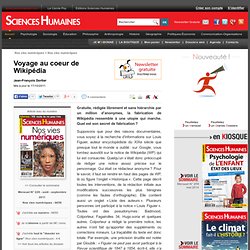
Quel est son secret de fabrication ? Supposons que pour des raisons documentaires, vous soyez à la recherche d’informations sur Louis Figuier, auteur encyclopédiste du XIXe siècle que presque tout le monde a oublié : sur Google, vous tombez aussitôt sur la notice de Wikipédia (WP) qui lui est consacrée. Quelqu’un s’était donc préoccupé de rédiger une notice assez précise sur le personnage. Qui était ce rédacteur anonyme ? Pour le savoir, il faut se rendre en haut des pages de WP, là où figure l’onglet « Historique ». Qui est Colporteur ? Qui écrit dans Wikipédia ? Colporteur, Fagairolles 34, Goublik… font partie de ce million de wikipédistes qui a participé à la rédaction d’articles de WP, depuis sa création en 2001. Un jeune activiste, Aaron Swartz, a voulu vérifier ce fait en réalisant une enquête personnelle sur les rédacteurs de WP (4). Y. Academics’ Views On and Uses of Wikipedia.
Abstract: Web 2.0 technologies bring both opportunities and challenges to our formalization of collective knowledge and its use.
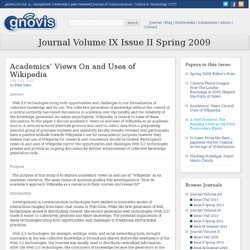
The collective generation of knowledge without the control of a central authority has raised discussions in academia over the validity and the reliability of the knowledge generated. Does Wikipedia Have a Place in Academia? Why I’m Talking About This For this week’s post, I discuss Wikipedia for two reasons; it is related to the broader topic of this blog and it is a big topic within academia. 1.
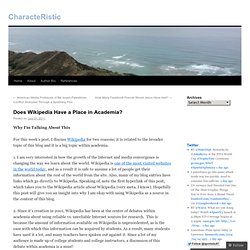
I am very interested in how the growth of the Internet and media convergence is changing the way we learn about the world. Why Trust Wikipedia? Caveat Lector (February 6, 2011) « Digerati & Technology Reports. By Harry {doc} Babad, © Copyright 2011, All Rights Reserved.
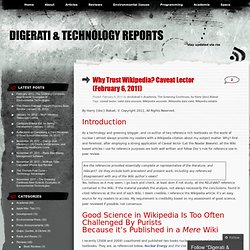
Introduction As a technology and greening blogger, and co-author of two reference rich textbooks on the world of nuclear I almost always provide my readers with a Wikipedia citation about my subject matter. Why? First and foremost, after employing a strong application of Caveat lector (Let the Reader Beware), all the Wiki based articles I use for reference purposes are both well written and follow Doc’s rule for reference use in peer review. Yes, tedious as it may seem, I go back and check, at least skim if not study, all the RELEVANT reference contained in the Wiki. Wikipedia in schools. As the world's most widely used on-line encyclopedia, Wikipedia will inevitably find its way into classroom activities.
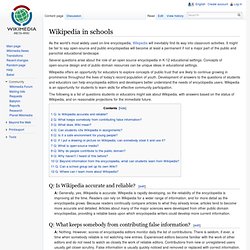
It might be fair to say open-source and public encyclopedias will become at least a permanent if not a major part of the public and parochial educational landscape. Several questions arise about the role of an open source encyclopedia in K-12 educational settings. Concepts of open-source design and of public domain resources can be unique ideas in educational settings. Wikipedia offers an opportunity for educators to explore concepts of public trust that are likely to continue growing in prominence throughout the lives of today's record population of youth. Development of answers to the questions of students and educators can help encyclopedia editors and developers better understand the needs of encyclopedia users. Is the content available on Wikipedia a reliable source for information? – Juggle.com. Verifiability. To discuss particular sources, see the reliable sources noticeboard.
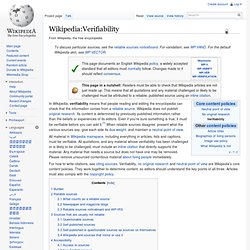
For vandalism, see WP:VAND. For the default Wikipedia skin, see WP:VECTOR. In Wikipedia, verifiability means that people reading and editing the encyclopedia can check that the information comes from a reliable source. Wikipedia does not publish original research. Its content is determined by previously published information rather than the beliefs or experiences of its editors.
The word on Wikipedia: Trust but verify - Nightly News. WebCite query result. WebCite query result. Youth Perception and Usage of Wikipedia. Brendan Luyt, Chia Zuhaila Bte Chia Zainal, Olivia Victoria Petines Mayo, and Tan Siow Yun Division of Information Studies, Wee Kim Wee School of Communication and Information, 31 Nanyang Link, WKWSCI Building, Singapore 637718 Introduction A number of studies have examined the accuracy and structure of Wikipedia (Chesney 2005; Cohen and Rozenzweig 2004; Emigh and Herring 2005; Voss 2005; Viegas et al. 2007), but little has been written to explain why people are drawn to it in the first place.
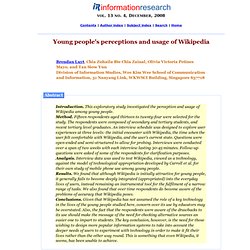
This exploratory study aims to investigate how young people, one of the major user groups of Wikipedia and of most concern to educators, perceive and utilize this tool from the perspective that this technology is socially constructed by users as well as designers. Wikipedia is a free, Web-based encyclopaedia running on wiki technology, a technology that allows anyone to quickly create or edit Web pages. Previous Work The social construction of technology. Reliability of Wikipedia. The reliability of Wikipedia (primarily of the English-language edition), compared to other encyclopedias and more specialized sources, has been assessed in many ways, including statistically, through comparative review, analysis of the historical patterns, and strengths and weaknesses inherent in the editing process unique to Wikipedia.[1] Wikipedia is open to anonymous and collaborative editing, so assessments of its reliability usually include examination of how quickly false or misleading information is removed.
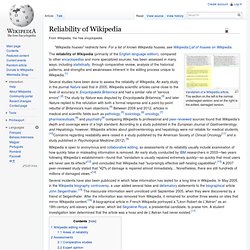
An early study conducted by IBM researchers in 2003—two years following Wikipedia's establishment—found that "vandalism is usually repaired extremely quickly—so quickly that most users will never see its effects"[12] and concluded that Wikipedia had "surprisingly effective self-healing capabilities".[13] A 2007 peer-reviewed study stated that "42% of damage is repaired almost immediately...
Nonetheless, there are still hundreds of millions of damaged views. "[14] Assessments. Online Encyclopedias, Wikipedia & Encyclopaedia Britannica, Passion Pit. When you Google the question "How accurate is Wikipedia?
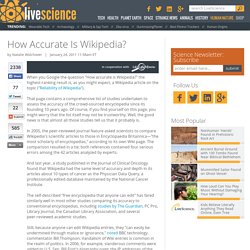
" the highest-ranking result is, as you might expect, a Wikipedia article on the topic ("Reliability of Wikipedia"). That page contains a comprehensive list of studies undertaken to assess the accuracy of the crowd-sourced encyclopedia since its founding 10 years ago. Of course, if you find yourself on this page, you might worry that the list itself may not be trustworthy. Well, the good news is that almost all those studies tell us that it probably is. In 2005, the peer-reviewed journal Nature asked scientists to compare Wikipedia's scientific articles to those in Encyclopaedia Britannica—"the most scholarly of encyclopedias," according to its own Wiki page.
Wikipedia survives research test. The free online resource Wikipedia is about as accurate on science as the Encyclopedia Britannica, a study shows.
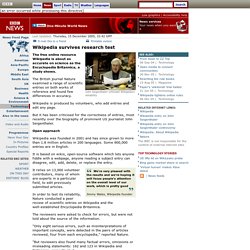
Experts rate Wikipedia's accuracy higher than non-experts. A new salvo has been fired in the perennial war over Wikipedia's accuracy. Thomas Chesney, a Lecturer in Information Systems at the Nottingham University Business School, published the results of his own Wikipedia study in the most recent edition of the online journal First Monday, and he came up with a surprising conclusion: experts rate the articles more highly than do non-experts. This less-than-intuitive finding is the conclusion of a study in which Chesney had 55 graduate students and research assistants examine one Wikipedia article apiece.
Each participant was randomly placed into one of two groups: group one read articles that were in their field of study, while group two read randomly-assigned articles. Respondents were asked to identify any errors that they found. Those in the expert group ranked their articles as generally credible, higher than those evaluated by the non-experts. Chesney's study was not intended to settle the debate. Is Wikipedia Reliable? The creators of Wikipedia are the first to admit that not every entry is accurate and that it might not be the best source of material for research papers. Here are some points to consider: Look for a slant. Some articles are fair and balanced, but others look more like the Leaning Tower of Pisa.
If an article has only one source, beware.Consider the source. Even if an article cites external sources, check out those sources to see whether they are being cited fairly and accurately — and do, in fact, reinforce the article's points.Look who's talking. In December 2005, the scientific journal Nature published the results of a study comparing the accuracy of Wikipedia and the printed Encyclopaedia Britannica. Study: Wikipedia as accurate as Britannica. FAQ/Schools. Help FAQs Schools Schools' FAQ. School and university projects. This page collects information about Wikipedia editing projects in school and university classes, including an archive of many past class projects. Interested in using Wikipedia assignments in your course? Try these resources: Identifying reliable sources. To obtain or provide community input on whether a source meets our reliability standards for a particular use, see the reliable sources noticeboard. Wikipedia articles should be based on reliable, published sources, making sure that all majority and significant minority views that have appeared in those sources are covered (see Wikipedia:Neutral point of view).
The guideline in this page discusses the reliability of various types of sources. The policy on sourcing is Wikipedia:Verifiability, which requires inline citations for any material challenged or likely to be challenged, and for all quotations. The policy is strictly applied to all material in the mainspace—articles, lists, and sections of articles—without exception, and in particular to biographies of living persons, which states: In the event of a contradiction between this guideline and our policies regarding sourcing and attribution, the policies take priority and editors should seek to resolve the discrepancy. Overview. Antonio J. Reinoso's PhD thesis. Where does the information come from? Information Source Use Patterns of Wikipedia.